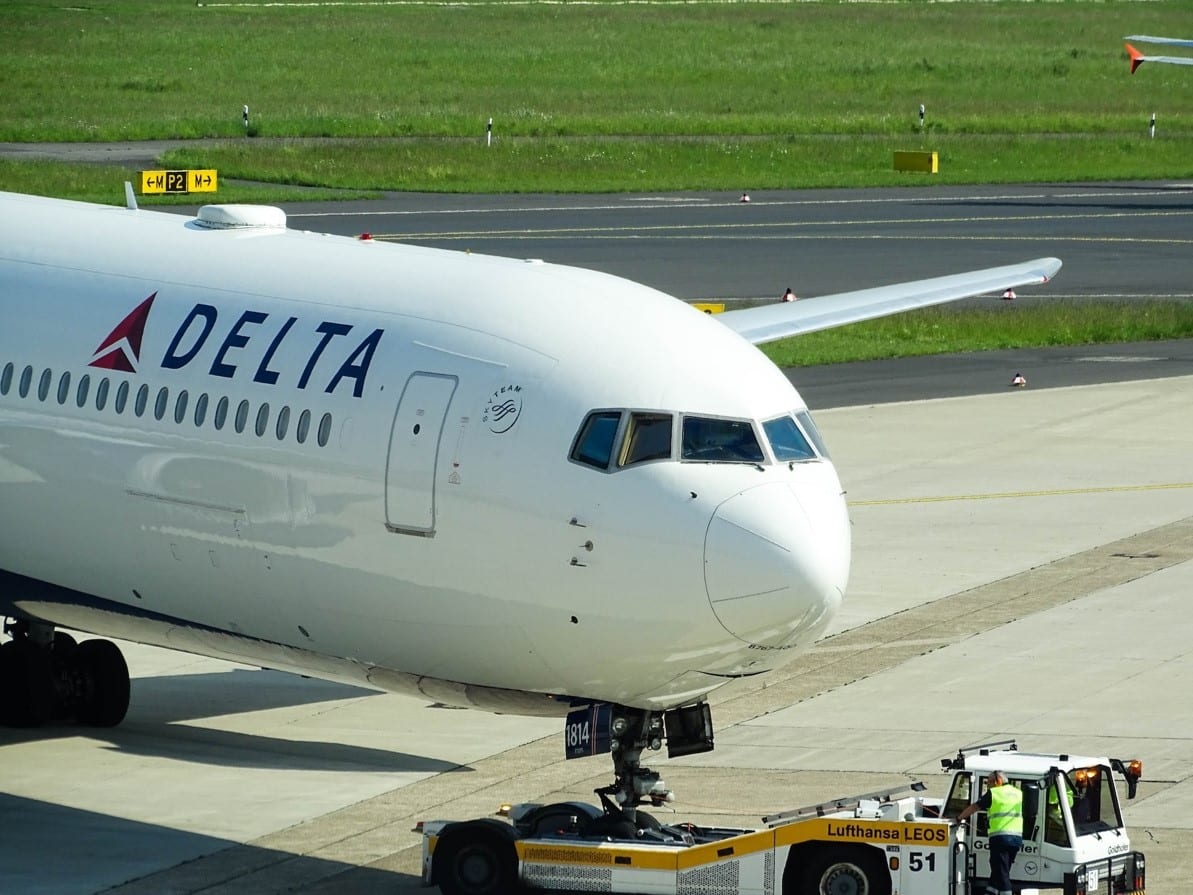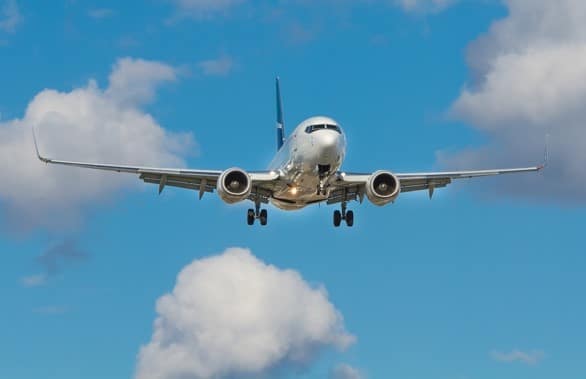Company: Delta Airlines
Founder: Collett E. Woolman
CEO: Ed Bastian
Year founded: 2 March 1925
Headquarter: Atlanta, Georgia, United States
Employees (2023): 100,000
Type: Public
Ticker Symbol: DAL
Annual Revenue (FY 2023): $50.5B
Profit | Net income (FY 2023): $4.6B
Products & Services: Food & Beverage | Comfort Plus | Delta’s Onboard Experiences | Delta One | Basic Economy | First Class | Premium Select | Inflight Entertainment
Competitors: Southwest Airlines | United Airlines | American Airlines Group | Hawaiian Airlines | Deutsche Lufthansa AG | Qantas Airways
Did you know? Over 4,000 Delta Air Lines take off each day, flying to more than 275 destinations across six continents
Delta Airlines Strengths
1. A large fleet
Delta Airlines stands out as one of the airlines with the largest fleet. As of the end of 2021, their fleet amounted to 1,200 aircraft.
Furthermore, they have one of the largest inventories worldwide of different types of airplanes, and they feature both Boeing and Airbus fleets.
2. Modern fleet
Not only do Delta Airlines have an enormous fleet, but it is also modern and follows the latest standards in the industry. This was a complete change from the past, where they would buy or lease older generation aircraft that they flew for up to 30 years.
That trend changed in 2011 when the company embarked on a fleet renewal effort to drive operating leverage. The new aircraft is 25% more energy efficient than the retiring ones.
3. Strong brand value
Every company stands to benefit when they have a strong brand image. That’s because they quickly gain customers’ confidence and trust. Delta Airlines capitalizes on its brand value and image to retain a leading role in the industry.
Customers easily choose the company because they have heard about it somewhere and easily associate with it. It is ranked as the most valuable airline in the world by branddirectory in 2022, with a brand value of $7.3 billion.
4. Recognized by authoritative platforms
Delta has been listed by several respected platforms. For instance, it took 38th place in the Just Capital company rankings of 2021.
Delta Airlines also has a name for itself among the Fortune 500 companies, with a ranking of #113 in 2022. These rankings help to take the company’s brand to the next level.
5. Great customer service
The company believes that attracting customers is one thing and retaining them is a whole different topic. Thus, it has heavily invested in customer support, efficient operations, and employee satisfaction. Delta is one of the most admired companies because of its streamlined processes.
Furthermore, its gender equity measures ensure that people of all genders have an ample working environment at the company. The company is recognized as #1 in customer satisfaction in North America by JD Power, and also #1 most admired airline by Fortune Magazine.
6. Alliances
Delta Airlines does not operate in isolation. Instead, it believes that it draws strengths when it enters into partnerships with other firms.
The company founded an alliance known as SkyTeam, which has 18 members that serve around 676 million customers every year.
In addition, it has codeshare agreements with other companies, including Virgin Australia, Virgin Atlantic, Korean Air, and Czech Airlines.
7. Numerous routes
In keeping up with its big brand name and massive fleet, the company has also adopted wide-ranging routes. That is, it offers flight services to several destinations globally.
It currently flies to 275 destinations across the world. The company has more than 4,000 flights every day, connecting people across six continents.
8. Large customer base
Delta Airlines serves aviation and airline customers from around the world and operates both commercial flights and cargo flights.
In normal years, the company serves around 200 million customers and transports on average 2.2 billion cargo ton-miles every year.
9. Reward programs
To achieve increased customer satisfaction, Delta Airlines runs several reward programs that keep passengers coming back for more. The SkyMiles program allows customers to earn miles for flying Main Cabin and above.
The reward also applies to each purchase. It has a high customer retention score of 78/100.
10. Strong financial position
The airline handles its finances in a very effective manner. It has a constant cash flow thanks to various revenue streams. The company has a cash conversion cycle of around -9 days, giving it ample room for liquidity.
From 2015-2019, the company generated on average $3.6 billion in free cash flows each year and returned 75% of the cash generated to investors. The different revenue streams give the company good returns on capital expenditure.
11. Industry-leading unit profitability
Delta Airlines has achieved high unit profitability of $2.37 per mile flown in the 5 years before covid, way ahead of the industry average of $1.90 per mile.
Delta Airlines Weaknesses
1. Relies on one market
The nature of the business that Delta Airlines runs is that its biggest market is just North America, which accounted for around 82% of total revenue in 2021.
Even though it’s been making an effort to expand in other regions, the dependence on one market proves to be a big weakness. Having a majority of its hubs in this single market can be a big problem in the long run.
2. Higher attrition rate
Delta Airlines encounters one of the highest attrition rates compared to the industry in general. That means the company has to invest more money in training employees. Some of these funds would have gone to developing other sections of the business.
3. Aircraft concerns
One of Delta’s aircraft engines, the Airbus A220, has been controversial in the industry. Delta currently has 11 Airbus A220, with 51 more on the road.
The engine developed problems, prompting the FAA to introduce guidelines for inspecting planes. Since Delta has so many of these aircraft, it has to come up with ways to reduce the risks they pose.
Delta Airlines Opportunities
1. Leverage social media
Delta Airlines can expand its social media standing to take advantage of the many benefits the platforms offer. The company can use this as an opportunity to enlarge its consumer base in ways that traditional marketing cannot.
Thanks to social media marketing, Delta would be able to engage with its customers and get helpful feedback.
2. Target millennials
Different studies suggest that millennials are spending the most on airline services. The airline can seize this moment by adopting measures that resonate with millennials.
3. Provide maintenance services
Delta’s maintenance division is instrumental in ensuring the company’s aircraft work seamlessly. Currently, it accounts for less than 3% of total revenue.
In 2021, the global aircraft maintenance market is valued at $87 billion and is expected to grow at around 4.6% CAGR for the next 8 years.
Delta Airlines can use this department as a business opportunity where it can start providing maintenance and overhaul services to other airlines.
4. Harness new technologies
As the airline industry enters into the digital age, more and more new technologies will be developed to improve customer experience and increase customer retention.
Delta Airlines Threats
1. Increased regulations
The industry continuously has to deal with new regulations from bodies such as FAA. The laws and regulations affecting Delta may lead to higher costs of operation as well as the risk of getting it out of business.
For example, Delta was fined $50k by US Department of Transportation for discriminatory conduct in 2020.
2. Stiff competition
Even though Delta Airlines has the largest fleet of aircraft, it has to deal with tough competition locally and internationally.
That forces the company to go beyond its regular marketing budget to beat competitors. Furthermore, the stiff competition takes away a sizeable chunk of potential customers.
3. The pandemic
The airline industry has been struggling ever since the COVID-19 pandemic hit us all.
People travel less often than before, meaning planes can sometimes fly with just a handful of passengers. Delta saw its revenue plunge by 64% in 2020 compared with 2019.
4. Geopolitical risks and rising fuel prices
Delta dramatically suffers from the consequences of geopolitical risks, most recently the Russian-Ukraine war. It has caused Delta to cut ties with Aeroflot, reroute its flights, and increase ticket prices.
The energy crisis and rising energy costs due to the war also put pressure on Delta’s operations.
References & more information
- Featured image by Miguel Ángel Sanz
Tell us what you think? Did you find this article interesting? Share your thoughts and experiences in the comments section below.












Add comment